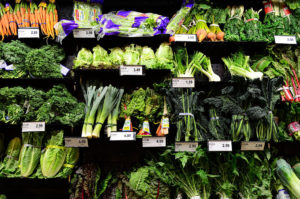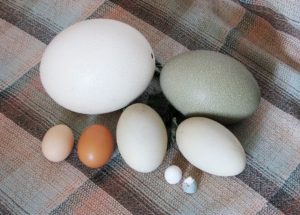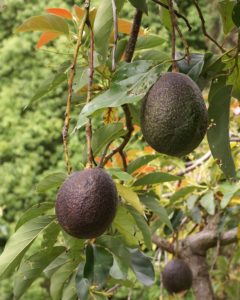Super Foods for Pregnant and Breastfeeding Women
With all of the excitement surrounding the new bundle, many expectant and nursing moms wonder how they will ever manage to work in the extra nutrients recommended by the experts. Filling up on nutrition-packed power foods will help you meet your extra nutrient needs during pregnancy and while nursing. Here is a list of foods that should be on the shopping list, not only for the mom or mom-to-be, but also for the whole family.
Some experts believe that breastfed babies may develop a taste for whatever mom eats because it is known that amniotic fluid and breast milk provide flavor exposure to baby. All the more reason to fill up on the following nutrient dense foods!
Colourful Fruits & Veggies
Load up on your favorite brightly colored fruits and veggies. Colorful produce is packed with good-for-you phytochemicals and fiber to help keep you healthy throughout your pregnancy and afterwards. Fill your plate half full of these antioxidant-rich foods at each meal will no only help you to meet your nutrient needs, it will also aid in shedding post-baby weight.
Yogurt
Your calcium needs increase during pregnancy. If you don’t take in enough calcium, the limited amount you do have will go to your baby, depleting the calcium in your bones and teeth. In addition to being high in calcium, yogurt is a good source of protein (especially Greek yogurts) and even those who are lactose intolerant can often tolerate yogurt. Look for sources that are fortified with vitamin D for extra calcium absorption. Some non-dairy sources of calcium include dark, leafy greens, sardines with bones, calcium-fortified orange juice, sesame seeds, almonds, dried fruit, tofu, and legumes.
 Eggs
Eggs
Eggs are rich in choline, which promotes your baby’s overall growth and brain health, while helping prevent neural tube defects. Eggs also contain important nutrients, including vitamin A, iron, and high quality protein. Your baby’s cells are growing at a rapid rate and every cell is made of protein. Don’t forget – as a pregnant woman, you have your own protein needs too! Note that most of the nutrition in eggs is found in the yolk so think twice before making an egg white omelet!
Fatty Fish
Fatty fish such as salmon, sardines, anchovies, herring, and trout provide omega-3 fatty acids, which are the primary components of brain tissue and are vital for brain and visual development. Note that pregnant and lactating women should limit their intake to no more than 150g (2 servings) of low-mercury fish per week and should also avoid larger, predatory fish (including tuna, shark, swordfish, and mackerel). Canned “light” tuna contains significantly less mercury than fresh tuna or canned albacore tuna.
Dark Leafy Green Vegetables
Kale and other dark, leafy greens are an important source of folic acid, which is recommended in higher amounts for all women in their childbearing years to help prevent neural tube defects in their children. They are a source of calcium, fiber, and vitamins A and C. They also contain high amounts of protective antioxidants. Other sources of folic acid include oranges, beans, asparagus, and berries.
Lean Meats & Legumes
Choose lean meats, poultry without skin, fish, eggs, tofu, lentils, dried beans, and peas. One serving is 75g or ½ cup. Aim to eat two servings per day of meat or meat alternatives. These foods provide iron that is important for you and your baby. Red meats such as lamb and lean beef are an excellent source of vitamin B12 and a good source of highly accessible iron and zinc. Zinc is important for growth and development of the growing baby. Adequate zinc levels also ensure optimal bone growth in developing babies and are necessary for immunity. If you are vegetarian, check in with your Registered Dietitian to make sure you are getting enough iron and other nutrients.
Sweet Potatoes
Sweet potatoes are packed full of vitamin A (as colorful beta carotene) and are a good source of vitamin E. The body converts beta-carotene to vitamin A, which is critical for the development of your baby’s eyes, skin, bones, and organs. By eating sweet potatoes with a little fat, you can increase the absorption of these fat-soluble vitamins. One word of caution: watch your intake of “preformed” vitamin A. It’s found in some supplements, fortified foods, medications, and skin products (look for the word retinol on the label as a clue). Unlike beta-carotene, which is completely safe during pregnancy, excessively high levels of preformed A can increase the risk of birth defects.
 Avocados
Avocados
Nutrient-dense avocados contain potassium, folic acid, and vitamin C. They also contain healthy monounsaturated fats, as well as significant quantities of the antioxidant lutein, which has been shown to be beneficial for eye health. Eating healthy fats will also help with satiety and stave off the mid-afternoon sugar cravings. Don’t forget the fat!
Nuts and Seeds
Nuts are a rich source of vitamin E and the B vitamins, as well as a whole host of minerals such as magnesium, manganese, selenium, zinc, copper, potassium, phosphorus, and iron, all of which are important for the developing fetus. Although nuts are high in fat, they contain primarily monounsaturated and polyunsaturated fat and have not been shown to promote weight gain when eaten in moderation (about a small handful five times a week).
Remember to drink plenty of water too! Water carries nutrients to your body and to your growing baby, keeps you cool, helps prevent constipation, and helps to control swelling.
Fill you face with these delicious and nutritious whole foods and feel confident that you are supporting both you and your little one’s current and future health.




